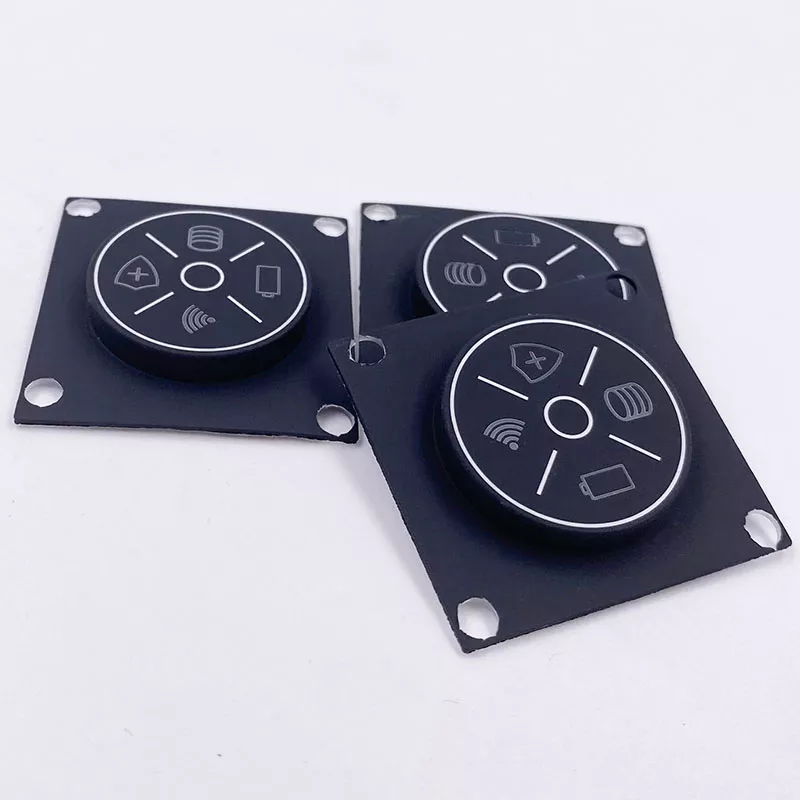Overview:
Compression molding silicone rubber Keyboard is made from durable, flexible silicone rubber, offering excellent tactile feedback and resistance to wear, moisture, and extreme temperatures. Ideal for electronic equipment, these keypads ensure long-lasting performance in industries like medical devices, consumer electronics, and automotive controls. Our factory provides OEM and one-stop services, offering complete solutions from design to production with a focus on precision and quality.
![]()
Details:
| Attribute | Details |
| Place of Origin | Xiamen, China |
| Brand Name | Custom |
| Color | Customized |
| Size | Standard size or customized size |
| Features | Eco-friendly |
| Durometer | 30-70 Shore A durometer |
| Model Number | OEM |
| Certification | ROHS |
| Usage | Multi-function |
| Material | Silicone |
| Packing | Carton |
| Shape | Custom Shape |
Production Process:
-
Design and Prototyping
The first step is to create a detailed design of the silicone rubber keypad, including the layout, dimensions, and tactile feedback requirements. A prototype is often created to ensure the design meets all specifications.
-
Material Preparation
High-quality silicone rubber is selected based on the required properties (e.g., durometer, color, flexibility). The silicone is then mixed with other additives like curing agents to ensure optimal performance.
-
Mold Creation
A precision mold is fabricated based on the design specifications. The mold is made of durable metal, typically aluminum or steel, and is used to shape the silicone rubber during the molding process.
-
Compression Molding
The prepared silicone rubber material is placed into the mold cavity, and the mold is then closed and subjected to heat and pressure. This process cures the silicone, giving it the desired shape and hardness (durometer).
-
Cooling and Removal
After molding, the silicone keypad is allowed to cool and solidify. Once cooled, the mold is opened, and the finished keypad is carefully removed.
-
Trimming and Finishing
Any excess material or flash around the edges of the keypad is trimmed away. Additional finishing processes, such as surface printing or coating, may be applied to enhance appearance and functionality.
-
Quality Control and Testing
The final product undergoes rigorous quality control checks, including tactile feedback testing, durability tests, and environmental resistance testing to ensure it meets the required standards.
-
Packaging
The completed silicone rubber keypads are carefully packed, often in cartons, and prepared for shipping or assembly into electronic equipment.
Surface Coating Options:
-
Matte Coating
A matte finish is applied to reduce glare and provide a smooth, non-reflective surface. This coating gives the keypad a premium, sleek appearance while also being easy to clean.
-
Glossy Coating
Glossy coatings offer a shiny, polished finish, enhancing the visual appeal of the keypad. This type of coating is commonly used in consumer electronics to achieve a modern, high-end look.
-
Epoxy Coating
Epoxy coatings are highly durable and provide excellent resistance to wear, chemicals, and UV light. This coating is often used for applications that require additional protection against harsh environmental conditions.
-
PU (Polyurethane) Coating
A PU coating is applied for added protection against scratches and abrasion while also providing a soft-touch feel. It enhances both the durability and tactile feedback, making it ideal for applications requiring frequent use.
Our Factory:
We operate a fully equipped facility with a diverse range of advanced machinery to ensure top-tier production quality. Our mold-making capabilities include cutting-edge CNC machines, Mirror EDM, EDM, Slow-speed Wire Cut (WC), and various auxiliary tools.
Our production lines are supported by 15 rubber compression machines and 2 LSR injection molding machines, allowing for efficient and precise manufacturing. To uphold our quality standards, we rely on a variety of testing and measurement equipment, including 3D projectors, sealing testers, elasticity testers, durometers, and a highly skilled QC team.
![]()
Additionally, our mechanical setup includes an AutoDryer Line, automatic screen printing machines, 3D measuring instruments, high-speed doming machines, die-cutting machines, and CNC machines. This combination of advanced automated systems and rigorous quality control ensures that we consistently deliver products of exceptional quality.

